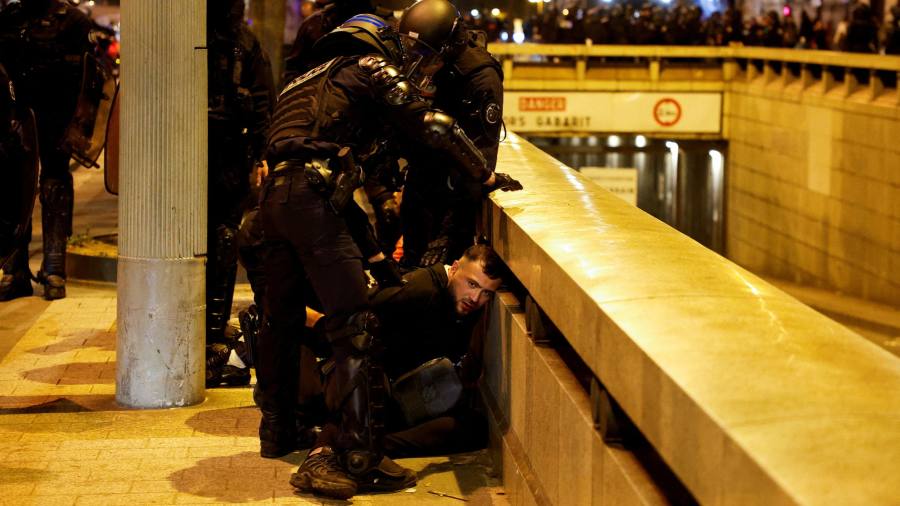French courts are holding quick-fire trials for people accused over the rioting that followed the police killing of a 17-year-old in a Paris suburb last week, as critics warn against harsh punishments for often young first-time offenders.
Hundreds of defendants have already been sentenced to jail and thousands more arrested following unrest that tore across the country after the fatal shooting of Nahel Merzouk. A total of 480 cases had been fast-tracked through the justice system as of Tuesday night, with some courts putting in place hotlines and weekend working hours.
In Bobigny, outside Paris, a man was jailed this week after he had set fire to a bin outside a vandalised police station. While the government has pushed for a tough response, defence lawyers argued that the brisk trials did not offer their clients a full chance at justice.
Justice minister Éric Dupond-Moretti, who rose to fame as a defence lawyer for accused terrorists and a rogue trader, has become the face of the Macron government’s legal response.
Calling for “firmness and effectiveness” in the courts, Dupond-Moretti said on Monday that he had “asked for systematic prosecutions, for prosecutors to recommend jail time when someone attacks a person . . . and for the most serious property damage”.
People accused of minor crimes can in France be put through a fast-track procedure known as an “immediate appearance”, in which they are interrogated by police and, if the evidence is deemed sufficient, appear before judges within days. Such cases have surged after 3,651 people were arrested over the rioting, including 1,124 minors.
About 60 per cent of those arrested had no criminal record, according to the interior ministry. At least 380 people have already been sentenced to prison in fast-track trials.
Bobigny and Grenoble courts were among those that opened over the weekend to cope with the number of cases. Some French courts have also set up phone lines dedicated to cases linked with the riots and have enabled magistrates to be transferred to the most affected courts.
On Tuesday, the audience benches of Bobigny judicial court were filled with young people, relatives and journalists watching defendants receive judgment.
One of these was Christophe Mayer, a man in his thirties who was sentenced to six months in prison for burning a bin outside Villepinte police station as part of a group that ransacked the area in a suburb of Paris.
“Where is the justice in that? All that for a bin,” shouted Mayer’s mother as she was ushered out of the courtroom by her husband.
Mayer, who works for a packaging company and had no criminal record, said that his act was a way of “avenging” the teenager’s death.
“It was for Nahel,” he said from behind a screen when asked why video footage showed him next to the burning bin with a group that also stole police bicycles and scooters.
The sentence in Mayer’s case was shorter than the year in prison requested by prosecutors. “He participated in the vandalising of this police station,” the prosecutor in the case alleged. “We need to sanction this kind of behaviour so that these actions do not happen again.”
At least 480 people involved in the riots have already been put through “immediate appearance” trials. In Nanterre, there were 40 such cases on Friday, compared with about 15 on a typical day, two lawyers said.
Mayer will now be sent to one of France’s already overcrowded prisons. Figures released by the interior ministry last week showed that the number of detainees had reached a historic high of 73,699 on June 1, about 16,000 above capacity.
Several defence lawyers representing clients taking part in these quick-fire cases said they feared it could lead to unwarranted sentences.
“Immediate appearance is an expedited form of justice, with zero level of rights for the defence,” said Fabien Arakelian, a lawyer representing clients in Nanterre judicial court. “You are judged quickly, without necessary guarantees. A justice that moves quickly is a justice that works badly.”
In other hearings throughout the afternoon, small business owners appeared in courtrooms to hear cases of people accused of ransacking their shops. Businesses are said to have sustained costs of €1bn, according to early estimates by French employers’ federation Medef.
Camille Bal, a defence lawyer in Marseille judiciary court, said a 28-year-old client of hers had received a 10-month sentence after stealing a can of Red Bull from a vandalised supermarket.
The court said he was guilty of breaking and entering the “totally vandalised” shop with three other suspects, took several other items and that he had previous convictions, including one for a similar crime.
“It’s about deterrence,” Bal said. “They want to send a strong message to those tempted, whatever their involvement. Watch out if you find yourself in court.”
The sheer number of cases has put a strain on those prosecuting and defending clients in recent days, said lawyers at Nanterre and Bobigny judicial courts.
Lawyer Rudy Albina defended three clients on Friday in Nanterre judicial court, working from 9am to 3am on Saturday.
“It makes defending very complicated because, at 1.30am, you’re too tired to think straight,” said Albina. “That’s why for me, urgent justice is botched justice because we don’t even have the time to prepare in the right way.”
The pressure on the justice system will continue. The average age of those arrested is 17. As minors cannot undergo fast-track trials in France, children’s courts will deal with their cases in the month ahead, an official at the justice ministry said.
Swift sentences may have helped quell further rioting but look unlikely to reduce antagonism between Paris’s disadvantaged suburbs and the police.
Commenting on the former careers of Mayer’s retired parents as ambulance and care workers, the presiding judge drew sniggers from young people in the courtroom when she referred to them as “jobs that are useful to society, like police officers”.
Read the full article here




